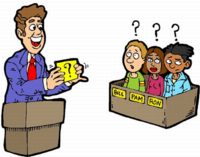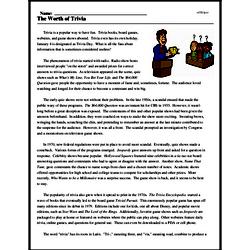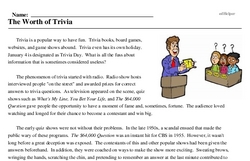The Worth of Trivia
Trivia Day
Reading Comprehension for January 4
Trivia is a popular way to have fun. Trivia books, board games, websites, and game shows abound. Trivia even has its own holiday. January 4 is designated as Trivia Day. What is all the fuss about information that is sometimes considered useless?
The phenomenon of trivia started with radio. Radio show hosts interviewed people "on the street" and awarded prizes for correct answers to trivia questions. As television appeared on the scene, quiz shows such as What's My Line, You Bet Your Life, and The $64,000 Question gave people the opportunity to have a moment of fame and, sometimes, fortune. The audience loved watching and longed for their chance to become a contestant and win big.
The early quiz shows were not without their problems. In the late 1950s, a scandal ensued that made the public wary of these programs. The $64,000 Question was an instant hit for CBS in 1955. However, it wasn't long before a great deception was exposed. The contestants of this and other popular shows had been given the answers beforehand. In addition, they were coached on ways to make the show more exciting. Sweating brows, wringing the hands, scratching the chin, and pretending to remember an answer at the last minute contributed to the suspense for the audience. However, it was all a front. The scandal prompted an investigation by Congress and a moratorium on television game shows.




